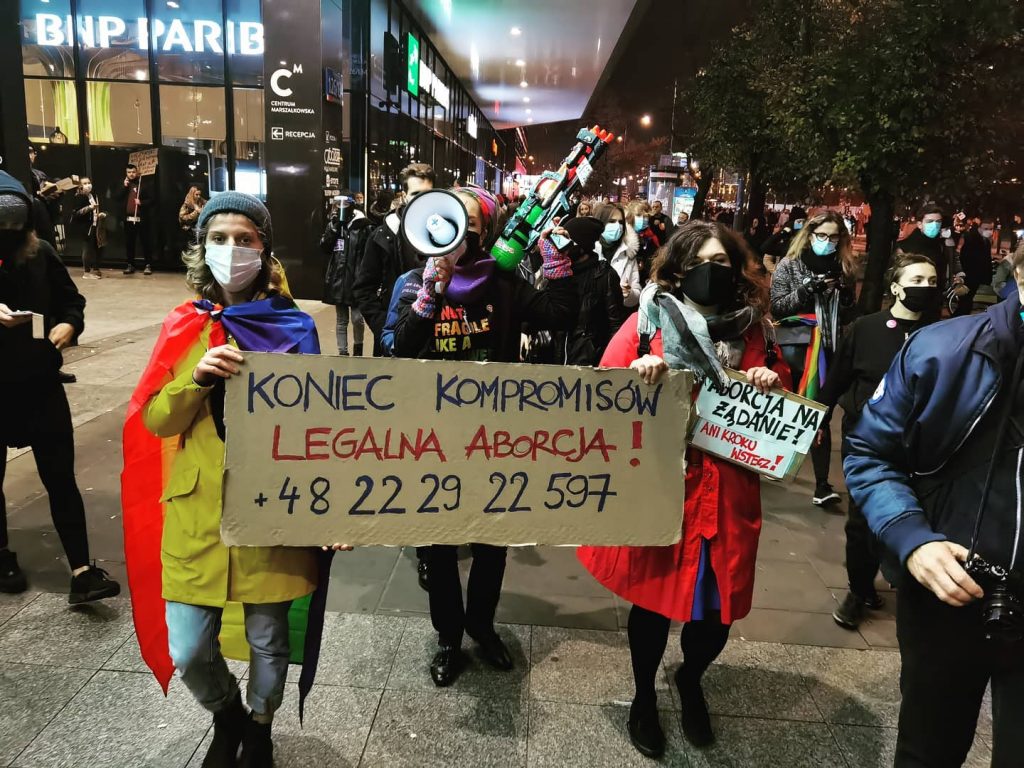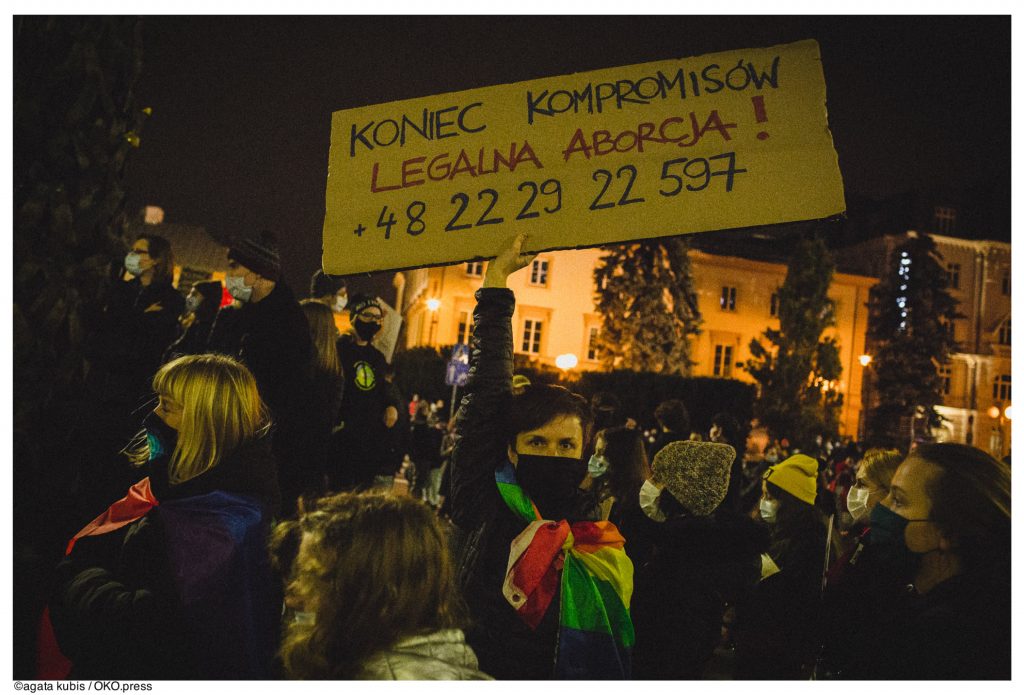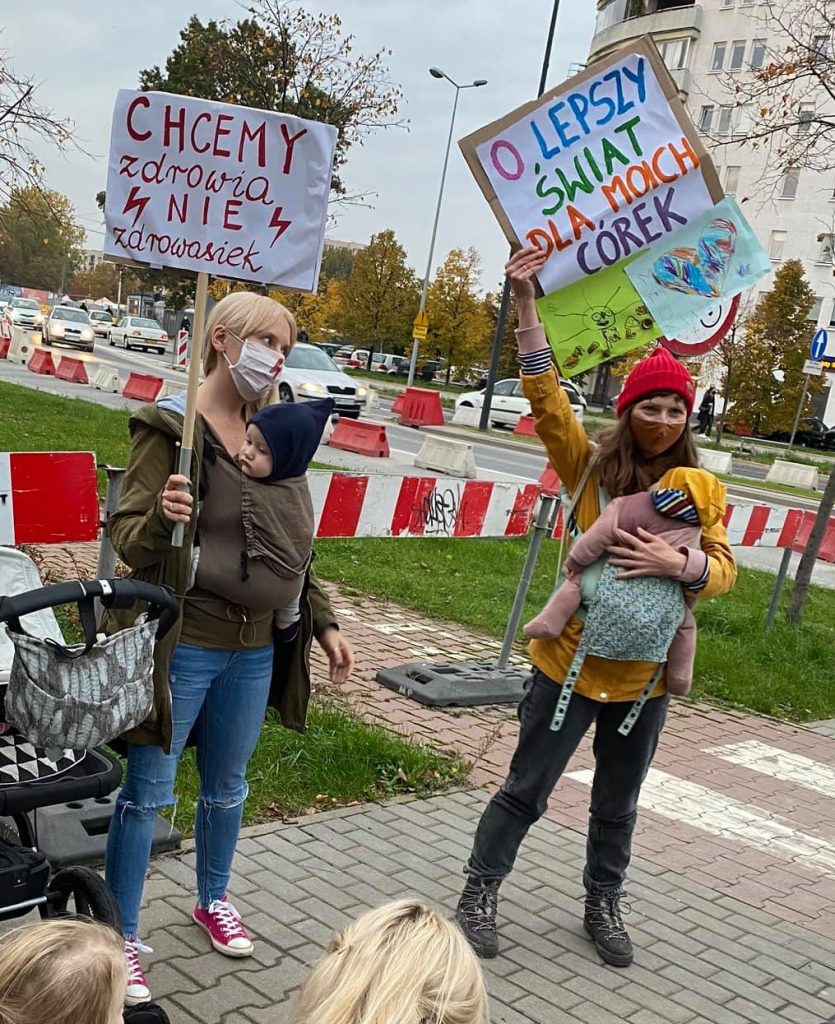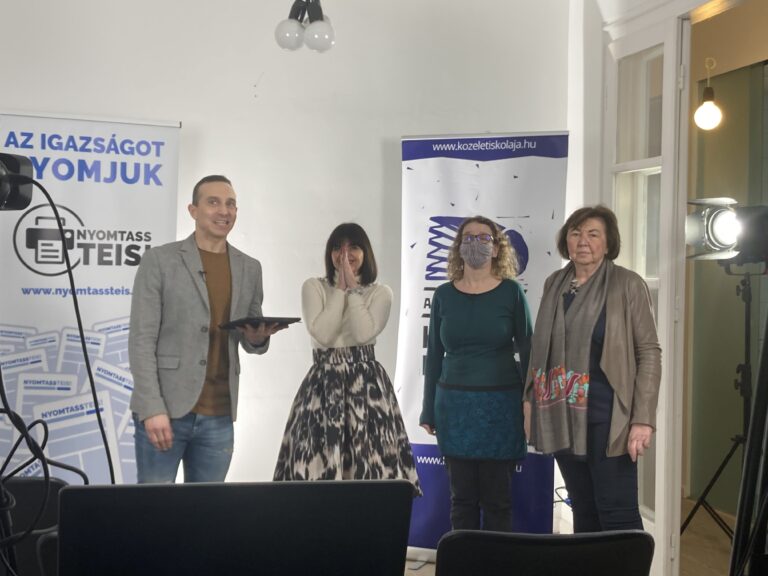“We all are the change that is happening now.”
On the 22nd October, 2020 the Polish Constitutional Tribunal made further restrictions about abortion law: they canceled that paragraph from EU’s already some of the strictest abortion laws, which accounted for 98% of legal terminations last year. Practically, this means they ban abortion in Poland. What is going on now in Poland from the perspective of a polish foundation, which builds feminist communities, and what can they do as an institution, which task and mission is to provide support? Interview with Justyna Frydrych, the founder of Feminist Fund.
Let’s jump into it with a personal question. In your opinion, what’s happening in Poland now and why?
Hundreds of thousands of people took to the streets in response to the decision of the Constitutional Tribunal to make further restrictions in the anti-abortion law in Poland. Voices strongly disagreeing with this decision are asking for the liberalization of the abortion law and are accompanied by anti-government slogans. Democratic Poland has not seen such an awakening of society so far. I don’t know what will happen on the political level, but it is obvious that the ruling coalition is completely unable to cope with such a strong reaction from society; they feel the heat. Jarosław Kaczyński stands firmly with the Constitutional Tribunal and has called for violence against the protesters. The government has announced that they will take action against the organizers of the strike and protests, against teachers who are taking part, etc. Some politicians want to restore the old law, which was also very restrictive, but I strongly believe that there is no return to this so-called “compromise”.
What happened in society is absolutely amazing, both in terms of awakening public awareness and in terms of solidarity among women and others. And no matter what happens on the political level, this social change will linger among us. Protests are being held all over Poland in large cities, towns and in small locations. Lots of people are becoming involved in co-organizing the events. Many people take to the streets, even where no one has ever protested before. There are plenty of young people on the street, people born after 2000, who have clear opinions about such a cruel invasion of their privacy and freedom. There are also people who remember when abortion was legal. We walk hand in hand with LGBT+ people, who are also a target of the ruling party in these protests.
The phone number of the Abortion Without Borders initiative has appeared everywhere, and many people know where to get help if necessary. There is a support network of different groups and activists who help people access abortion. The language of this protest has also changed — we talk about abortion openly, although until recently, the word “abortion” rarely appeared even at feminist marches. Now we’re going for abortion. We start to perceive abortion as a common experience. We call for abortion on demand. I hope these voices will stay with us. None of this would have happened without activists counteracting the stigma around abortion and changing the way we talk about it, e.g. the Abortion Dream Team. Yes, we are in the midst of a revolution on many levels.
These voices are accompanied by anti-government and anti-church rhetoric, which is sometimes even more heard in the streets. They seem to be more attractive to some of the protesters, which is not surprising. Anyway, we need to remember that pro-abortion voices cannot get lost among such slogans as “fuck off” or “fuck the Law and Justice”. The way we speak about abortion has changed, but the language of protest is also different, it’s sharp and very direct, with no apology. We no longer scream: “we want to…” – instead, we scream: “get the fuck out”, “it’s a war!”. This is how our society, placed against a wall, expresses its anger at the ruling coalition, at the church that plays such a significant role in this oppression, and at the politicians who established (behind women’s back) and guarded the “abortion compromise” for 27 years. It is also necessary to emphasize that we are taking to the streets in a time of pandemic, social isolation, economic insecurity, a time still heavily influenced by the church, with indoctrination at schools, and attacks on minorities.
What does it all mean? The ruling coalition has lost public support and its legitimacy to exercise power. That is clear.
I would like to add that I am also impressed with what is happening within the movement itself. This movement is very self-critical; it changes, it moves forward. It demands a place for queer people and for people with disabilities so that their voices are heard. It makes sure that pro-abortion slogans are not pushed to the background in the streets. It fights mansplaining, which is so common in Polish debates. We say clearly: “This is our revolution, don’t tell me what to feel, what to think, how to express myself, how to protest and what we should fight for in the first place. No more men explaining things to us!”.

150,000 people demonstrated on the 30th October, Friday night in the centre of Warsaw. What is the general attitude and opinion of Polish women and society in general about the decision of the Constitutional Court and the situation it brings?
An attack on freedom and dignity, health and body, results in great anger. It is a sharp, emotional reaction to the total arrogance and impertinence of the authorities. This decision of the Constitutional Court hits basically everyone, which is why hundreds of thousands of people took to the streets. Why? Because it turns out that abortion is our common experience, it is our common need. It concerns everyone — people from small villages and from cities, young girls and women, those who do not have children and those who already have children, people with low incomes and those who are quite wealthy. The right to abortion is something that can be useful to every woman. Every woman wants to feel safe, wants to be sure that pregnancy won’t be a threat to her. Even if someone was a supporter of the current law (which permits abortion on three grounds, but de facto prohibits abortion), could theoretically terminate a pregnancy in case of embryopathological defects in the fetus. Now, women will not only be forced to continue pregnancy in case of genetic defects, but their health and life will also be at risk. Due to this political decision, women lost their sense of security and agency in their own lives. And out of this helplessness and frustration, they are taking to the streets. After all, we feel that this terrible political decision has a real effect on our lives.
The black protests on abortion of 2016 already laid the foundation for the expression of this anger, but those protests were different. The situation was different. The language was different. Back then, the protesters wanted to stop the attempt to restrict the anti-abortion law –— calls for liberalization were still quite muted. Abortion activism was basically unknown. Nowadays the social support for abortion on demand is pretty high. It is the result of pushing the debate forward, crossing certain taboos by pro-abortion activists. The rhetoric has changed since the black protests. Now we are in a completely different place as a society. We do not accept the absurdities of patriarchy, fundamentalism, and extreme oppression. It won’t pass anymore. We do not want to be polite. We are not interested in negotiations. We are not afraid of the authorities, even when they try to repress us.

As the only women’s grantmaking fund in Poland, the Feminist Fund has helped the activities of girls‘, women‘s and feminist groups with financial assistance since 2018. What kind of programs do you run and what do you see as your biggest achievements over these 2 years?
The Feminist Fund supports, among others, grassroots initiatives, especially those whose presence in the feminist movement has not been that obvious so far. We eagerly support initiatives that move the feminist movement forward, i.e. by taking up unpopular topics. These are often informal groups, very new initiatives, those with little experience, and often they come from small towns and villages. They oppose patriarchy in their local environment, and have been pushed out of the movement. As a fund we create space for various initiatives and persons to act by expanding this space in the feminist movement.
We definitely had good timing. The fund was established shortly after the aforementioned feminist awakening in Poland in 2016. New groups and initiatives emerged from the protests, energized and eager to take on initiatives. This was reflected in our first call for proposals.
I also think that we educate about feminism. Firstly, the activities of grantee partners fill the word “feminism” with meaning — we show specific persons, groups, their activities and the topics they deal with. Secondly, we educate by promoting our values. We all believe that values such as solidarity, social justice and mutual trust are the very foundations of feminism.
Another achievement we are proud of is the independence of FemFund. We are independent from the government and businesses. This gives us the freedom to act in line with our mission and respond to the needs of women, persons and the feminist movement. FemFund is secure. Currently, 200 people support the Fund with regular donations. This is how we consistently build our financial independence. Thanks to this, we do not have to compromise and can be friendly and flexible in our grantmaking.
It is certainly a great success that over these past three years, the Fund has developed a wonderful feminist community of persons sharing similar values, trusting, supporting and inspiring one another. This community includes: groups applying for support and jointly deciding who will receive funding, donors willing to share their money with others, and numerous other allies.

How is your foundation reacting to the current situation directly or indirectly? How can your team participate, and what can you do now, when basic human rights are damaged?
We absolutely want to stick to our mission. FemFund has been formed to enable feminists, women, and persons socialised for female roles to access independent, stable, and friendly money for their activities; — to do what they need and want, following their own rules. We will focus on what we have done so far: providing financial and nurturing grassroots initiatives all over Poland. We believe that the needs of the movement will be reflected in the next call for proposals, but at the same time, we don’t want to define what is most important at the moment.
However, we do not intend to step into other organisations’ and groups’ shoes, or take over their roles. FemFund is a fund –; it does not organize mass demonstrations or collections, it does not provide urgent support. This is what others do, and they do it well.
I can also share with you that next year we will launch a new kind of support. In addition to mini-grants, we will offer core funding to feminist organisations.
At the same time, we present different grantee partners (including those on the outskirts of the movement) taking part in the protests, organising themselves in their locations and taking to the streets. And we do our best to show that we all are the change that is happening now.
As a team we take part in the events, show solidarity with the organizers, provide our channels to promote various events, and speak up on matters important to us (e.g. that abortion is also a matter of non-binary and trans persons, that our aim is abortion on demand — free, legal, available, — and that there is no feminism and no revolution without the LGBTQ community).
I’m on maternity leave now and some events were simply not available to me. But it turned out that there were some smaller, local events being organised spontaneously. In my area of Warsaw, Ursynów, we local mothers wanted to express our anger and frustration. We wanted to do something, and within a few hours, “something” became a street-blockade and a big march of 2,000 people through the district. For the first time, people took to the streets there. I felt so empowered seeing such wonderful sisterhood and solidarity against oppression.


